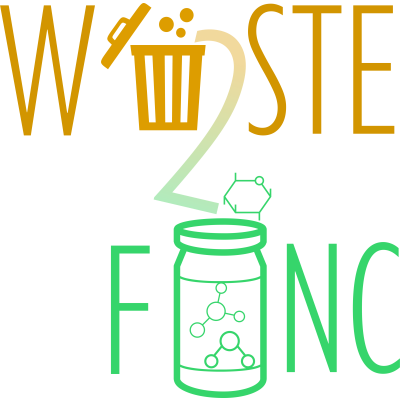
WASTE2FUNC
Lactic acid and biosurfactants sourced from sustainable agricultural and industrial (food) WASTE feedstocks as novel FUNCtional ingredients for consumer products

Lactic acid and biosurfactants sourced from sustainable agricultural and industrial (food) WASTE feedstocks as novel FUNCtional ingredients for consumer products
With Europe’s admirable aspirations to create a circular economy, the focus increasingly falls on minimising waste and finding new applications for otherwise underexploited or unused resources. Food waste is a particular problem here; some sources estimated that – in 2012 – there were almost 90 million tonnes of food waste generated in the EU. This arose at all stages of the food production chain - primary production, processing, wholesale and retail, food service – as well as from domestic settings. If the EU is to be successful in its ambitions, it urgently needs to address this issue.
However, developing any effective response will be challenging; the sources of waste – and thus the potential biomass – is scattered across multiple locations, making it difficult to collect. In addition, supply is intermittent and available volumes vary according to a number of influences. This makes it challenging to ensure reliable supplies and establish sustainable supply chains as a result. The upshot is that such waste regularly finds its way to low-value applications such as biofuels or to no-value outcomes such as landfill or incineration, with the subsequent contribution to greenhouse gas emissions.
To address this problem, the WAST2FUNC project is seeking to create, as a demonstration, a new and sustainable biomass waste supply chain. This will integrate fluctuating supplies of agricultural food crop biomass waste with an industrial food waste supply chain in order to demonstrate the potential for converting this combined stream into lactic acid and microbial biosurfactants as functional ingredients of home and personal care applications. In so doing, it will increase up to ten times as much value from these waste streams, will reducing CO2 emissions by 20% and increasing employment where the waste streams are sourced, in Belgium where the demonstration will take part as well as in the rest of Europe.
The overarching objective of the WASTE2FUNC project is to demonstrate the viability of valorising intermittent food waste streams in a way that makes them sustainable enough to build reliable value chains and increase their value. Within this, the project will pursue a number of specific objectives.
The project will also strive to increase awareness of the scale of food waste and its potential inherent value as a source of biomass.
The WASTE2FUNC project is aims to make a number of impacts capable of contributing to the wider goals of the BBI-JU. These will include: